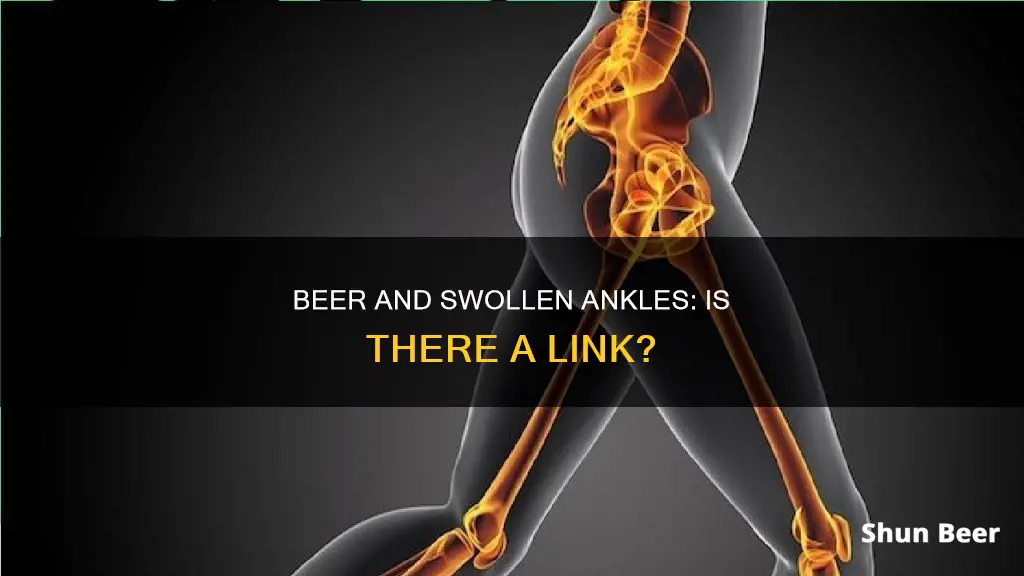
Drinking too much beer can cause swelling in the ankles, feet and legs. This is due to the diuretic effects of alcohol, which encourage the kidneys to produce more urine, leading to dehydration. As the body gets dehydrated, it starts drawing water from the cells into the bloodstream to maintain blood pressure and keep vital organs functioning properly. This fluid shift is the main cause of edema, or water retention, which can result in swelling in the ankles, feet and legs. While this swelling is usually temporary and not serious, it could be a sign of a more serious health condition such as heart problems, liver damage or kidney issues. If you experience persistent or severe swelling, it is important to seek medical attention.

Alcohol and Edema
Drinking too much beer can indeed cause swelling in the ankles, feet, and legs. This condition is called edema, which is the swelling caused by water retention in the body. While edema is most common in the legs, ankles, and feet, it can also occur in the face, hands, and stomach.
Edema is triggered by alcohol's dehydrating properties. Alcohol is a diuretic, which means it encourages the kidneys to produce more urine, leading to dehydration. Alcohol also blocks the release of the antidiuretic hormone (ADH) or vasopressin, which normally signals the kidneys to reabsorb water. Without enough ADH, the body urinates more than usual, leading to dehydration. As the body tries to rebalance its fluid levels, it may start retaining too much extra fluid, resulting in edema.
In most cases, swelling in the ankles and feet due to alcohol consumption is not serious and usually goes away within a couple of days. However, frequent or prolonged swelling could indicate a more significant issue, such as pulmonary edema, liver damage, or heart problems.
If you experience edema after drinking alcohol, there are several steps you can take to reduce or avoid swelling:
- Drink alcohol in moderation.
- Avoid excessive salt intake.
- Drink water along with alcoholic beverages to reduce dehydration.
- Elevate your legs and wear compression socks if swelling occurs.
While occasional swelling of the feet or leg pain after drinking alcohol is typically not a cause for concern, persistent or severe swelling should be addressed. If you experience swollen feet accompanied by other symptoms such as shortness of breath, fatigue, rapid weight gain, or a persistent cough, it is recommended to seek medical attention.
Understanding Beer Quantities: 16 Oz Beers and Their Drink Equivalents
You may want to see also

Alcoholic Neuropathy
Drinking too much beer can cause swelling in the ankles, and this is usually not serious if it's infrequent. This is due to a condition called edema, which is caused by water retention in the body. Edema is triggered by alcohol's dehydrating properties, as alcohol blocks the release of the antidiuretic hormone (ADH) or vasopressin, which normally causes the kidneys to conserve fluids. This leads to increased urination, causing dehydration, and as a result, the body starts retaining extra fluid, leading to edema.
Now, on to the topic of Alcoholic Neuropathy:
Symptoms:
- Pain
- Paresthesias (abnormal sensations such as "pins and needles")
- Numbness
- Ataxia (loss of balance or coordination)
- Muscle weakness and spasms
- Problems with urination
- Fast heartbeat
- Dizziness or lightheadedness
Diagnosis:
There is no specific lab test available for diagnosing alcoholic neuropathy. Doctors will perform a physical examination and take a detailed medical history, including questions about alcohol consumption and the type, severity, and frequency of symptoms. Additional tests may be ordered to rule out other possible causes of neuropathy, such as vitamin deficiencies, diabetes, and HIV. These tests may include nerve conduction tests, nerve biopsy, electromyography (EMG), and blood tests to check for vitamin deficiencies and electrolyte levels.
Treatment:
The most crucial aspect of treating alcoholic neuropathy is abstaining from alcohol. Treatment also focuses on improving nutrition by replacing key nutrients such as thiamine (vitamin B1), vitamin B12, and folic acid. Counseling, support groups, cognitive behavioral therapy, and medications like naltrexone, acamprosate, and disulfiram can help manage alcohol use disorder. Physical therapy and orthopedic appliances may be necessary to maintain muscle function and limb position.
Beer and Conception: What You Need to Know
You may want to see also

Heart Problems
Drinking too much beer can cause swelling in the ankles, and while this is usually not a serious issue, persistent swelling could be a symptom of a heart problem.
Swelling in the feet and ankles can be a symptom of heart failure. When the heart is not pumping blood effectively, blood flow slows down, causing blood returning to the heart through the veins to back up. This backup leads to an increase in pressure within the veins, pushing fluid out into the surrounding tissues, causing swelling, usually in the lower parts of the body, such as the legs, ankles, and feet.
If you experience swollen feet and also experience symptoms such as shortness of breath, fatigue, rapid weight gain, and a persistent cough, these may be signs of heart problems requiring immediate medical attention.
In addition, if you experience swollen feet alongside symptoms such as difficulty breathing, extreme fatigue, or a rapid or irregular heartbeat, you should seek medical attention immediately. This could be a sign of pulmonary edema, which is caused by congestive heart failure. In this scenario, increased pressure in the blood vessels of the lungs pushes fluid into the air sacs, preventing the lungs from filling with enough air, leading to shortness of breath.
Beer and Heartburn: Is There a Link?
You may want to see also

Liver Damage
Drinking too much beer can indeed cause swelling in the ankles, and this could be a sign of liver damage.
If you suspect liver damage, it is important to seek medical advice. A doctor can perform the necessary tests to diagnose any issues and provide guidance on managing alcohol consumption to prevent further damage.
Other Causes of Swelling
While liver damage is a potential cause of swelling in the ankles, there are also other factors to consider. Alcohol consumption can lead to dehydration, which in turn triggers the body's fluid retention mechanisms, resulting in edema. Additionally, alcohol can decrease the production of vasopressin, a hormone that signals the kidneys to reabsorb water. With less vasopressin, more water is lost through urination, contributing to dehydration and fluid retention.
Swelling in the ankles can also be caused by various other factors, including:
- Prolonged sitting
- High salt intake
- Certain medications
- Pregnancy
- Heart problems
- Kidney disease
- Blood clots
Beer and Knee Pain: Is There a Link?
You may want to see also

Kidney Disease
Drinking too much beer can cause swelling in the ankles, and this is often due to a condition called edema—swelling caused by water retention in the body. While edema is usually not serious and goes away within a couple of days, frequent swelling could indicate a larger issue.
One of the main functions of the kidneys is to release excess fluid from the body. When the kidneys are not functioning properly, it can be difficult for them to perform this role, which can result in swelling in the feet. This is known as peripheral edema, where fluid pools in the feet and ankles due to the effects of gravity.
Alcohol consumption can lead to dehydration, which in turn causes the body to retain more water. This is because alcohol blocks the release of the antidiuretic hormone (ADH) or vasopressin, which is responsible for signalling the kidneys to conserve fluids. With less ADH, the body urinates more, leading to dehydration. As the body tries to compensate for the fluid loss, it may start retaining too much water, resulting in edema.
If you experience frequent or persistent swelling in the ankles or feet, it is important to consult a doctor to rule out any underlying health issues, such as kidney disease or other serious conditions.
Celiac Disease and Beer: What's the Danger?
You may want to see also
Frequently asked questions
Yes, drinking too much beer can cause swelling in the ankles. Alcohol consumption can lead to water retention and dehydration, resulting in a condition called edema, which is characterised by swelling in various parts of the body, including the ankles.
Alcohol interferes with the production of the antidiuretic hormone (ADH) or vasopressin, which is responsible for signalling the kidneys to reabsorb water. With reduced levels of ADH, the body urinates more, leading to dehydration. As a result, the body tries to compensate by retaining extra water, causing edema and swelling in the ankles.
The swelling in the ankles due to alcohol consumption usually subsides within a couple of days. However, if the swelling persists, it could indicate a more serious underlying health issue, such as liver or heart problems.
To reduce swelling in the ankles, it is recommended to elevate your feet above the level of your heart, reduce salt consumption, and drink plenty of water to counteract dehydration.







